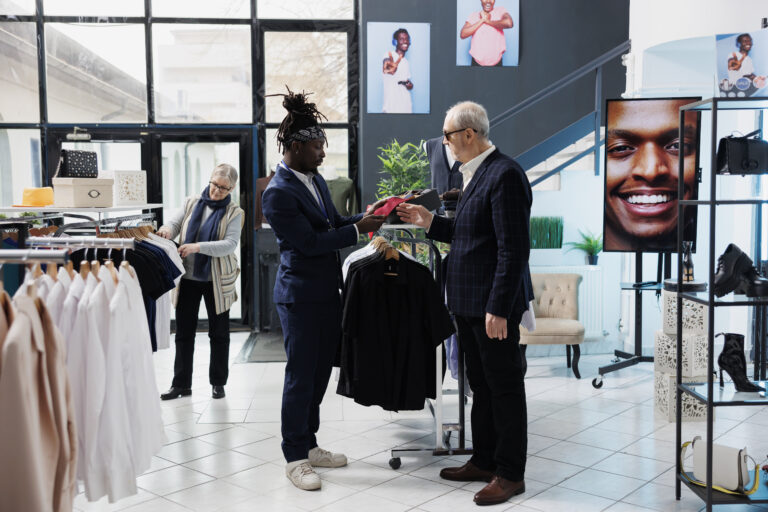Dress for Success: A Job-Seeker's Guide

First impressions matter, especially when it comes to job interviews. Dressing appropriately for your industry and the specific role you’re applying for can make a lasting impression on potential employers.
Why would that be important, you may ask?
Well, while your skills and qualifications are paramount, your attire communicates professionalism, cultural fit, and attention to detail.
Not sure where to start? That’s okay! Here’s some of our tips and ideas on how you can dress for success in different industries and ace your first impression!
Why Dressing for Success Matters
Your outfit can speak volumes before you even say a word at an interview. Employers often assess your professionalism, seriousness about the role, and cultural fit based on your appearance. So, if you’re wearing the right attire, it shows respect for the company and indicates that you’ve taken the time to understand their workplace culture. Conversely, inappropriate clothing might unintentionally suggest a lack of preparation or attention to detail.
Deciding What to Wear
Research the Company and Industry!
Every industry has its own norms for workplace attire. You can research the company’s dress code by:

1. Visiting their website or social media pages:
Look for team photos or event images to understand their typical attire.

2. Checking online reviews (on platforms like Glassdoor):
Employees often share insights about workplace culture, including dress codes. Look for team photos or event images to understand their typical attire.

3. Asking a recruiter or other contact at the company:
If you’re unsure, it’s okay to ask for guidance! Don’t be afraid to ask questions; it shows that you’re genuinely interested.
Dress One Step Above the Role
For interviews, try and aim to dress slightly more formally than the company’s standard dress code. This shows you’re serious about the opportunity and willing to make an effort. For example, if the workplace leans business casual, consider wearing a blazer with dress pants or a polished dress!
But maybe you have the outfit now, and you’re worried about prepping for the interview, itself? Not to worry, KES has a collection of articles to help you with interviewing, including:
Consider the Role
The position you’re applying for may also dictate your attire. Creative roles, such as graphic design or teaching elementary school grades, often allow for more stylish or colorful outfits, while corporate positions may require formal suits or dresses.
Corporate and Finance
- Recommended attire: Business formal, such as tailored suits, conservative ties, and neutral-colored blouses or dresses.
- Why it works: These industries value professionalism and attention to detail, which are reflected in formal attire.
Technology and Startups
- Recommended attire: Business casual, including polo shirts, chinos, blouses, and smart-casual shoes.
- Why it works: Tech companies often prioritize comfort and practicality, but maintaining a polished look demonstrates respect.
Creative Fields (e.g., Fashion, Advertising)
- Recommended attire: Stylish and trendy outfits that reflect your personal brand while staying professional, such as tailored pants with a bold top or a unique blazer.
- Why it works: These roles often value individuality and creativity, which can be subtly showcased in your outfit.
Healthcare
- Recommended attire: Clean, conservative business attire, such as slacks and blouses or suits.
- Why it works: This field emphasizes cleanliness and trust, and a polished look conveys professionalism.
Trades and Skilled Labor
- Recommended attire: Clean, practical clothing, such as khakis and a collared shirt, or attire suited for the role (e.g., steel-toed boots for on-site interviews).
- Why it works: Practicality and safety are crucial, and dressing appropriately shows understanding of the job’s demands.
Additional Tips for Dressing for Success
- Pay Attention to Grooming: Ensure your hair, nails, and accessories are neat and clean. Avoid overpowering perfumes or colognes; try to stick to scent-free products where possible.
- Invest in Key Staples: A well-fitted blazer, classic dress shoes, and neutral dress pants or skirts can be mixed and matched for various occasions.
- Keep It Comfortable: Choose clothing that fits well and allows you to sit, stand, and walk comfortably. If you’re constantly adjusting your outfit, it may distract you during the interview.
- Plan Ahead: Lay out your outfit the night before to avoid last-minute stress, and check it over for wrinkles, stains, tears, or missing buttons.
- Mind Cultural Sensitivities: If you’re applying to an international company, research cultural expectations around dress to avoid faux pas.
- Dressing for success is more than just “looking good”; it’s about showing that you understand the expectations of your chosen field and the specific company you hope to join. By researching the role, planning your outfit, and ensuring everything is polished and professional, you’re taking a crucial step toward making a great first impression!
Remember, the goal isn’t to impress with extravagance but to demonstrate that you belong. Confidence and comfort in your outfit will help you focus on what truly matters: showcasing your skills and personality. Good luck—you’ve got this!

Additional resources to help you “dress for success”!
(Bonus this month: 8 additional resources, and a downloadable PDF of all the links from this article for you to reference, anytime)!
Indeed has a great article that helps you understand the differences between business and smart casual, with ideas, options, suggestions, and more.
Kootenay Employment Services has a collection of articles on various career advice topics that might give you some addional insight!
Monster offers practical advice and examples of outfits for various professional settings.
Indeed’s guide to professional attire includes helpful tips for tailoring your look to specific roles.
Forbes breaks down the differences between dress codes to help you choose wisely.
Affordable & ethical clothing options in Canada!
A Canadian brand offering high-quality essentials made from sustainably sourced Egyptian cotton. Kotn focuses on ethical production and supports fair wages for its workers.
Affordable & ethical clothing options in Canada!
Based in Toronto, Encircled creates versatile, sustainable, and ethically made clothing designed for busy lifestyles. Their products are crafted with eco-friendly fabrics.
Affordable & ethical clothing options in Canada!
Frank and Oak, a Montreal-based company that offers stylish, eco-conscious clothing made from recycled and sustainably sourced materials. Their collections cater to men and women, combining fashion and environmental responsibility.